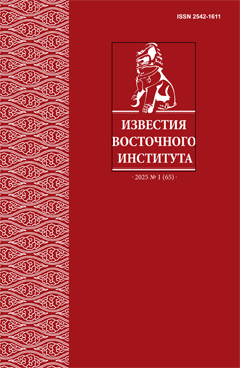"The Japanese have already attacked ...": peasants and military personnel of the Far East of the USSR about the probability of a Japanese invasion in the 1930s
DOI:
https://doi.org/10.24866/2542-1611/2025-1/118-126Keywords:
Far East, reactions, moods, Soviet government, Japanese, peasants, collective farm, OKDVA, military personnelAbstract
An active comprehensive study of the formation and semantic contents of the reactions of the population of the USSR and its individual representatives began in historiography only a few decades ago. But still it has not received proper coverage in the historical literature. The responses of the peasants and military personnel of the OKDVA in the period under review depended on various socio-economic and political aspects of life and everyday life. The purpose of the article is to analyze statements, as one of the most important forms of reactions of peasants and military personnel about the probability of war with Japan and the defeat of the USSR in the early 1930s, contained in archival documents, most of which are being introduced into scientific circulation for the first time. Critical and negative reactions came from those who, for various reasons, could not adapt to the new realities of life. The fear of war as a phenomenon, as well as problems of an economic nature and general criticism of the political course of the state caused a negative reaction. The semantic components of the reactions influenced the formation of evaluative judgments of the population regarding public policy. Seeing this as a threat, the authorities classified these people as politically unreliable and carried out their removal from the environment (arrest) and forced relocation.
Downloads
References
1. Билим Н.Н. Политические настроения дальневосточников в конце 1920-х – начале 1930-х годов // Исторические, философские, политические и юридические науки, культурология и искусствоведение. Вопросы теории и практики. 2015. № 7 (57): в 2-х ч. Ч. II. С. 32-34.
2. Болокина Л.А. Негативные настроения жителей Калининской области накануне Великой Отечественной войны // Известия Алтайского государственного университета. 2009. №4. С. 32-35.
3. Бушуева Т.С. Общественные настроения в Красной армии. 1920-е – 1934 г. М.: МПГУ, 2020. 444 с.
4. Всесоюзная перепись населения 1939 г.: Основные итоги. М.: Наука, 1992. 256 с.
5. Дэвис С. Мнение народа в сталинской России: Террор, пропаганда и инакомыслие, 1934-1941. М.: Российская политическая энциклопедия (РОССПЭН); Фонд «Президентский центр Б.Н. Ельцина», 2011. 231 с.
6. Иващенко В.А. Антисоветские настроения населения (по материалам оперативных данных ОГПУ ДВК) // Россия и АТР. 2007. №2. С. 30-37.
7. Краснознаменный Дальневосточный: История Краснознаменного Дальневосточного военного округа/Ред. И.М. Третьяк. – 3-е, испр. и доп. изд. М.: Воениздат, 1985. 348 с.
8. Кулаков П.П. Антисоветские настроения и их преодоление в ОКДВА в начале 1930-х гг. // Власть и управление на Востоке России. 2014. № 1. С. 103–110.
9. Лейбович О.Л. «Война на Западе уже началась …»: разговоры 1939 г. в бараках, тюрьмах и очередях // Шаги/Steps 2016. Т. 2. №. 1. С. 14-27.
10. Лившин А.Я. «Военная тревога» 1927 года и общественные настроения в Советском Союзе // Государственное управление. Электронный вестник. 2015. Выпуск №50. С. 190-206.
11. Песков В.М. Военная политика СССР на Дальнем Востоке в 30-е годы XX века. Хабаровск: Изд-во ХГПУ, 2000. 348 с.
12. Пикалов Ю.В. Морально-политический облик бойцов Особой Краснознаменной Дальневосточной армии накануне конфликта на китайско-восточной железной дороге в 1929 г. // Общество: философия, история, культура. 2018. № 1. С. 89-93.
13. Рыбаковский, А.А. Население Дальнего Востока за 150 лет. - М.: Наука, 1990. 157 с.
14. Токарев С. В. Политические настроения населения советской провинции во второй половине 1930-х гг. (На материалах Центрально-Черноземного региона): дис. … канд. ист. наук. Курск. 2004. 206 с.




